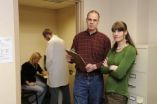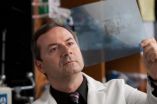(Press-News.org) AMES, Iowa -- Why would anyone falsely confess to a crime they didn't commit? It seems illogical, but according to The Innocence Project, there have been 266 post-conviction DNA exonerations since 1989 -- 25 percent of which involved a false confession.
A new Iowa State University study may shed light on one reason for those false confessions. In two experiments simulating choices suspects face in police interrogations, undergraduate subjects altered their behavior to confess to illegal activities in order to relieve short-term distress (the proximal consequence) while discounting potential long-term (distal) consequences.
"The thing about these exoneration cases is that they all pertained to heinous crimes; that's why there was DNA evidence available. And so we wanted to determine why someone may be willing to falsely confess to one of those crimes," said Stephanie Madon, an ISU associate professor of psychology and the study's lead author. "We thought it might have to do with the pay-off structure of police interrogations. Some interrogation methods -- like physical isolation and the presentation of false evidence -- have immediate consequences for suspects that encourage them to confess. Though they also face consequences that encourage them to deny guilt -- such as the possibility of conviction and incarceration -- these consequences are more distal.
"So the suspect is weighing these two consequences at once and that's going to shape their behavior," she continued. "That's what we were interested in understanding. Which of these consequences is going to influence confession decisions -- those that are happening right now, or the ones that may happen in the future?"
Iowa State researchers Max Guyll, an assistant professor of psychology; Kyle Scherr, a psychology graduate student; Sarah Greathouse, a former assistant professor of psychology; and Gary Wells, Distinguished Professor of psychology; collaborated with Madon on the study. It will be posted online this week by the journal Law and Human Behavior.
In the first experiment, 81 (38 women, 43 men) ISU psychology undergraduates were interviewed about their prior criminal and unethical behaviors, with their admissions and denials each paired with proximal or distal consequences. The proximal consequence was having to answer a long set of repetitive questions. The distal consequence was having to meet with a police officer in several weeks to discuss their answers in detail.
Researchers found that participants shifted their admissions to avoid the short-term consequence of repetitive questions.
"What we found is that our participants clearly made admission decisions on the basis of the proximal consequence," Madon said. "They would admit to having done some criminal or unethical behavior in order to avoid answering repetitive questions. And they did that even though they knew that it increased the likelihood that they would have to meet with the police officer in several weeks to discuss their answers in more detail."
In the second experiment, 143 (93 women, 50 men) ISU psychology undergraduates were again interviewed about their prior criminal and unethical behaviors. This time, the proximal and distal consequences were reversed from the first experiment. So the proximal consequence was meeting with the police officer immediately after the interview, while the distal consequence was to return to the lab in several weeks to answer the repetitive questions.
"Once again, the participants' admissions were shaped by the proximal consequences. They did not want to meet with the police officer," Madon said. "And so, they responded in a way that got them out of doing that -- even though it increased their likelihood of coming back in several weeks to answer repetitive questions."
The researchers say these results may help explain why some suspects confess to crimes in order to avoid a police interrogation -- even though they increase their risk of conviction and severe penalties by doing so. The study's authors theorize that innocent suspects so strongly believe that the truth will eventually be borne out, they may perceive the distal consequences facing them -- conviction, prison, or even a death sentence -- to be remote and unlikely.
"One of the things we wanted to do in this research was to identify an underlying process at play during interrogations, so it can apply to a variety of police interrogation methods," Madon said. "Our findings have implications for any [police interrogation] method that causes suspects to focus on immediate consequences over future consequences."
Madon sees the results underscoring the need to limit the use of police interrogation methods that may exploit suspects' vulnerabilities and encourage them into making confession decisions on the basis of short-term gains.
INFORMATION:
Iowa State study examines why innocent suspects may confess to a crime
2011-02-20
ELSE PRESS RELEASES FROM THIS DATE:
Study links hypoxia and inflammation in many diseases
2011-02-20
Yet some athletes deliberately train at high altitude, with less oxygen, so they can perform better. Their bodies adapt to the reduced oxygen.
Now a doctor at the University of Colorado School of Medicine has explored the relationship between lack of oxygen, called hypoxia, and the inflammation that can injure or kill some patients who undergo surgery. In a liver transplant, for example, the surgery and anesthesiology can go perfectly yet the new liver will fail because of hypoxia.
"Understanding how hypoxia is linked to inflammation may help save lives of people who ...
Space weather disrupts communications, threatens other technologies
2011-02-20
A powerful solar flare has ushered in the largest space weather storm in atleast four years and has already disrupted some ground communications on Earth, said University of Colorado Boulder Professor Daniel Baker, an internationally known space weather expert.
Classified as a Class X flare, the Feb. 15 event also spewed billions of tons of charged particles toward Earth in what are called coronal mass ejections and ignited a geomagnetic storm in Earth's magnetic field, said Baker, director of CU-Boulder's Laboratory for Atmospheric and Space Physics. Such powerful ejections ...
How couples recover after an argument stems from their infant relationships
2011-02-20
When studying relationships, psychological scientists have often focused on how couples fight. But how they recover from a fight is important, too. According to a new study published in Psychological Science, a journal of the Association for Psychological Science, couples' abilities to bounce back from conflict may depend on what both partners were like as infants.
Researchers at the University of Minnesota have been following a cohort of people since before they were born, in the mid-1970s. When the subjects were about 20 years old, they visited the lab with their romantic ...
Scientists bioengineer a protein to fight leukemia
2011-02-20
LOS ANGELES (February 18, 2011) – Scientists at the Children's Center for Cancer and Blood Diseases and The Saban Research Institute of Children's Hospital Los Angeles today announced a breakthrough discovery in understanding how the body fights leukemia. They have identified a protein called CD19-ligand (CD19-L) located on the surface of certain white blood cells that facilitates the recognition and destruction of leukemia cells by the immune system. This work represents the first report of a bioengineered version of CD19-L, a recombinant human biotherapeutic agent, ...
1 person of 1,900 met AHA's definition of ideal heart health, says University of Pittsburgh study
2011-02-20
PITTSBURGH, Feb. 18 – Only one out of more than 1,900 people evaluated met the American Heart Association (AHA) definition of ideal cardiovascular health, according to a new study led by researchers at the University of Pittsburgh School of Medicine. Their findings were recently published online in Circulation.
Ideal cardiovascular health is the combination of these seven factors: nonsmoking, a body mass index less than 25, goal-level physical activity and healthy diet, untreated cholesterol below 200, blood pressure below 120/80 and fasting blood sugar below 100, explained ...
Anti-aging hormone Klotho may prevent complications
2011-02-20
DALLAS – Feb. 17, 2011 – Low levels of the anti-aging hormone Klotho may serve as an early warning sign of the presence of kidney disease and its deadly cardiovascular complications, according to findings by UT Southwestern Medical Center researchers.
Using mice, investigators found that soft-tissue calcification, a common and serious side effect of chronic kidney disease (CKD), improves when Klotho hormone levels are restored. The study is available online in the Journal of the American Society of Nephrology.
The essential Klotho protein, which is produced by the kidneys, ...
How disordered proteins spread from cell to cell, potentially spreading disease
2011-02-20
One bad apple is all it takes to spoil the barrel. And one misfolded protein may be all that's necessary to corrupt other proteins, forming large aggregations linked to several incurable neurodegenerative diseases such as Huntington's, Parkinson's and Alzheimer's.
Stanford biology Professor Ron Kopito has shown that the mutant, misfolded protein responsible for Huntington's disease can move from cell to cell, recruiting normal proteins and forming aggregations in each cell it visits.
Knowing that this protein spends part of its time outside cells "opens up the possibility ...
A better way to diagnose pneumonia
2011-02-20
Researchers from the Georgia Institute of Technology have created a new sampling device that could prevent thousands of people worldwide from dying of pneumonia each year.
Called PneumoniaCheck, the device created at Georgia Tech is a solution to the problem of diagnosing pneumonia, which is a major initiative of the U.S. Centers for Disease Control and Prevention (CDC).
Pneumonia, an inflammation of the lungs, kills about 2.4 million people each year. The problem is particularly devastating in Africa, Southeast Asia and the Eastern Mediterranean, where a child dies ...
New model for probing antidepressant actions
2011-02-20
The most widely prescribed antidepressants – medicines such as Prozac, Lexapro and Paxil – work by blocking the serotonin transporter, a brain protein that normally clears away the mood-regulating chemical serotonin. Or so the current thinking goes.
That theory about how selective serotonin reuptake inhibitors (SSRIs) work can now be put to the test with a new mouse model developed by neuroscientists at Vanderbilt University.
These mice, described in the online edition of the Proceedings of the National Academy of Sciences (PNAS), express a serotonin transporter that ...
Enhancing nuclear security: Training and international collaboration
2011-02-20
While a world free of nuclear weapons remains a goal for governments around the world, nuclear security constitutes a major challenge for the 21st century, as recognised at the 2010 nuclear security summit in Washington. Citizens are generally aware of international efforts to prevent the proliferation of nuclear weapons, but they are often unaware of nuclear security research and the important role science in this field. A new European nuclear security training centre and enhanced international collaboration are good examples.
A recent survey on the EU´s radiological ...



